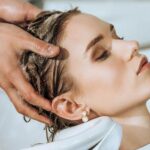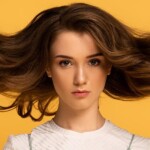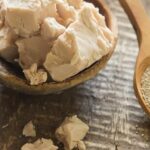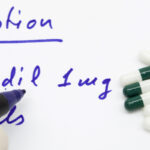Many patients struggling with excessive hair loss look for solutions in hair care – reaching for shampoos, conditioners, or scalp tonics with supposedly strengthening properties. Unfortunately, not every cosmetic available on the market actually supports hair growth. What’s more, many popular products contain ingredients that can further irritate the scalp, weaken hair follicles, or even worsen alopecia. That’s why it is so important to know how to read cosmetic labels and consciously choose products that truly address the needs of the scalp and hair during periods of weakness. In the following article, we explain what to look for when analyzing cosmetic ingredients, which substances to avoid in hair loss, and which components can support regeneration and hair growth.
INCI list – what exactly is it and why should you know it?
The list of cosmetic ingredients provided on packaging is called INCI (International Nomenclature of Cosmetic Ingredients). It is a global standard that allows consumers to check which substances a product contains – regardless of the marketing promises on the label. The substances are listed in order, from the most to the least abundant. Therefore, the first five items already reveal a lot about the real effect of the product.
To properly interpret an INCI list, it is important to know that some names are written in Latin (e.g. Aqua – water, Cocamidopropyl Betaine – foaming agent), while others are in English or as chemical names. The more recognizable, natural ingredients appear at the beginning of the list, the higher the chance that the cosmetic will be gentle. However, “natural origin” alone is not enough – it also matters whether the product contains potentially irritating additives.
“Scalp care is not only a matter of aesthetics – it’s daily prevention. A properly chosen shampoo can truly support alopecia therapy.”
— Dr Piotr Turkowski
Substances that may worsen scalp condition and aggravate hair loss
For people with weakened hair, thinning, or active alopecia, cosmetics containing harsh detergents, drying alcohols, silicones that form an impermeable layer, or synthetic fragrances can be particularly harmful. The most common irritating ingredients include:
Sodium Lauryl Sulfate (SLS) and Sodium Laureth Sulfate (SLES) – highly foaming detergents that can damage the scalp’s hydrolipid barrier, leading to dryness, irritation, itching, and reactive hair loss. Although they effectively remove impurities and sebum, they are not recommended for people with sensitive scalps.
Learn more what SLS and SLES mean
Denatured and isopropyl alcohols (Alcohol Denat., Isopropyl Alcohol) – they have a drying effect, which can cause scalp overreactivity, flaking, and secondary weakening of hair follicles. While some alcohols (e.g. cetyl, stearyl) are gentle and emollient, these “harsh” ones should be avoided.
Parabens, artificial fragrances and dyes (e.g. Parfum, D&C Red, Yellow 5) – may act allergenic and pro-inflammatory, which in people prone to hair loss can intensify scalp inflammation and disrupt the hair growth cycle.
Silicones (e.g. Dimethicone, Cyclopentasiloxane) – although they smooth hair and provide instant shine, over time they can coat the scalp and follicle openings, limiting gas exchange and hindering active ingredient penetration. This may worsen scalp condition and slow hair growth.
Which ingredients support scalp health and hair growth?
Cosmetics for people with alopecia should be above all gentle, well-tolerated by the skin, and at the same time contain active substances that support microcirculation and hair growth. Ingredients worth choosing include: panthenol, allantoin, niacinamide, caffeine, biotin, as well as plant extracts from nettle, burdock, horsetail, ginkgo, or green tea. Their action is based on improving scalp blood flow, regulating sebaceous gland activity, soothing inflammation, and supporting hair follicle metabolism.
Products containing biomimetic peptides, plant stem cells, sulfur amino acids (e.g. cysteine, methionine), and follicle-strengthening complexes are also gaining popularity. Although often more expensive, they can significantly affect the quality and speed of hair regrowth – especially when used regularly and as recommended by a specialist.
The most common ingredients in hair cosmetics and their impact on alopecia
| Ingredient | Effect | Recommended / Avoid | Notes |
|---|---|---|---|
| SLS/SLES | Strong detergent, may irritate scalp | ❌ Avoid | May cause dryness and hair loss |
| Alcohol Denat. | Dries scalp, may cause itching | ❌ Avoid | Be cautious in people with AD or SD |
| Dimethicone | Silicone coating the scalp | ⚠️ Limit | May hinder follicle oxygenation |
| Panthenol | Moisturizes and soothes irritation | ✅ Recommended | Supports healing and skin regeneration |
| Niacinamide | Regulates sebum, supports follicles | ✅ Recommended | Common in trichological products |
Does “natural” always mean better?
Many patients choose natural cosmetics hoping they will be gentler for skin and hair. Indeed, products based on plant ingredients can be effective, but even among them there are formulas not suitable for scalp with alopecia problems. Some essential oils, e.g. peppermint, tea tree, or rosemary, may act irritatingly, especially with prolonged use or on sensitive skin. The same applies to some natural preservatives, which may trigger allergic reactions.
Therefore, what matters is not whether a cosmetic is “eco” or “traditional,” but whether its formula is adapted to the specific scalp condition. In cases of alopecia, it is worth choosing dermatologically tested products, preferably recommended by a trichologist or dermatologist.
How to choose cosmetics for hair loss problems?
The best solution in alopecia is conscious care – that is, care that supports the natural hair growth cycle, does not irritate the scalp, and does not block hair follicles. It is always worth choosing products with a short, transparent composition, without harsh detergents, alcohols, and synthetic additives. Cosmetics should be selected individually, according to the diagnosis and type of alopecia – we act differently in androgenetic alopecia, differently in telogen effluvium, and yet differently in cicatricial alopecia or anagen effluvium.
At Piotr Turkowski’s clinic, we help our patients not only treat the causes of hair loss, but also support their daily care – advising on trichological products that do not irritate the scalp and performing treatments that stimulate the growth of new, healthy hair.






